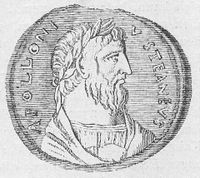Apollonius Tyaneus
| Apollonius of Tyana | |
|---|---|

Apollonius of Tyana, engraving of a 4th century Roman bronze medallion in the Cabinet des Médailles, National Library of France
|
|
| Born | c. 1st-2nd Century AD |
| Died | c. 1st-2nd Century AD |
| Era | Ancient philosophy |
| Region | Anatolia |
| School | Hellenistic philosophy |
|
Main interests
|
Pythagoreanism |
|
Influences
|
|
|
Influenced
|
|
Apollonius of Tyana (Ancient Greek: Ἀπολλώνιος ὁ Τυανεύς; c. 15 – c. 100 AD), sometimes also called Apollonios of Tyana, was a Greek Neopythagorean philosopher from the town of Tyana in the Roman province of Cappadocia in Anatolia. He was an orator and philosopher around the time of Jesus, and was compared with Jesus of Nazareth by Christians in the 4th century and by other writers in modern times.
Apollonius was born into a respected and wealthy Greek family. Although the precise dates of his birth and death are uncertain, most scholars agree that he was a contemporary of Jesus of Nazareth. His primary biographer, Philostratus the Elder (circa 170 – c. 247), places him circa 3 B.C. – c. 97 A.D.
By far the most detailed source is the Life of Apollonius of Tyana, a lengthy, novelistic biography written by the sophist Philostratus at the request of empress Julia Domna. She died in 217 A.D., and he completed it after her death, probably in the 220s or 230s A.D. Philostratus’s account shaped the image of Apollonius for posterity and still dominates discussions about him in our times. To some extent it is a valuable source because it contains data from older writings which were available to Philostratus but disappeared later on. Among these works are an excerpt (preserved by Eusebius) from On Sacrifices, and certain alleged letters of Apollonius. The sage may have actually written some of these works, along with the no-longer extant Biography of Pythagoras. At least two biographical sources that Philostratus used are lost: a book by the imperial secretary Maximus describing Apollonius’s activities in Maximus's home city of Aegaeae in Cilicia, and a biography by a certain Moiragenes. There also survives, separately from the life by Philostratus, a collection of letters of Apollonius, but at least some of these seem to be spurious.
...
Wikipedia
